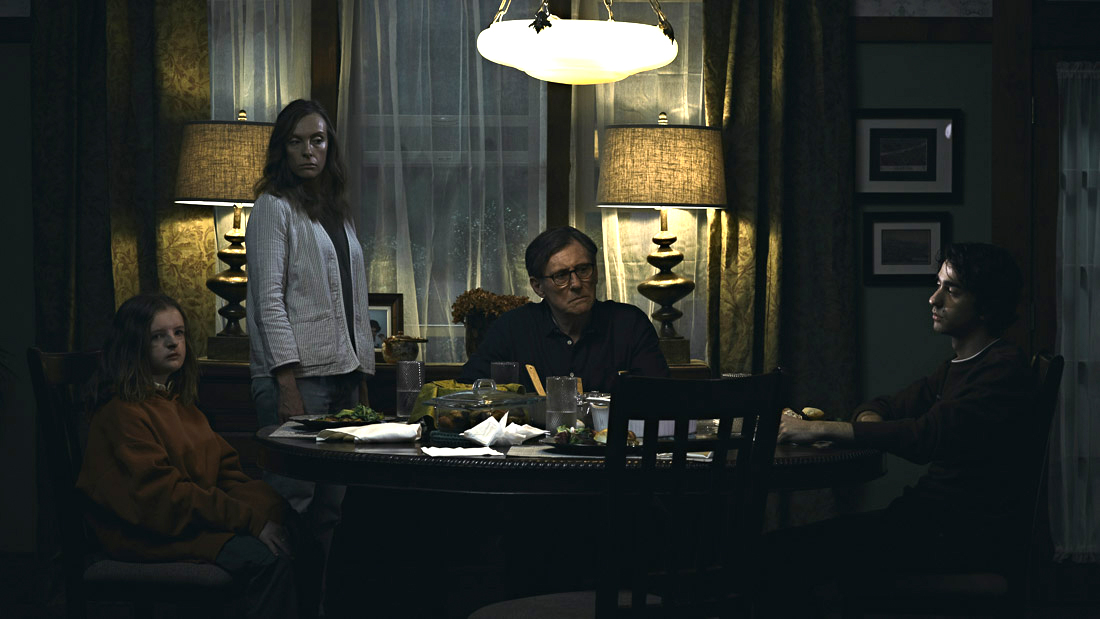Hereditary is the best scary movie of the year
These terrors go deep


A free daily email with the biggest news stories of the day – and the best features from TheWeek.com
You are now subscribed
Your newsletter sign-up was successful
It's not that hard for a horror movie to jolt an audience. Most follow a formula: Darken the screen, threaten to populate the blank spaces with some kind of monster, fill the soundtrack with increasingly intensifying, droning music, and then, bang! Whatever happens next — be it a harmless kitty-cat leaping out from under a bed, or an actual thrill-killer smashing through a window — viewers jump out of their skins.
Writer-director Ari Aster's supernatural thriller Hereditary handles the routine scary stuff reasonably well. At 127 minutes, the picture's much longer than a typical shocker, and it's paced so deliberately that anyone who demands steady stimulation may come away disappointed. But on the rare occasions that Hereditary just goes ahead and shouts "boo!" (figuratively speaking), the moments are effectively alarming.
Overall though, this film aims to offer more than a good, sharp startle. Like the recent horror classics The Babadook, It Follows, and The Witch, Hereditary is creepy in a deeper, more insinuating way. Because of that, a lot of genre connoisseurs are going to adore this picture, while others may find it frustratingly arty and aloof. It'll renew a debate as old as horror fandom itself: What exactly "scares" us? And why (and how) do we want to feel that way?
The Week
Escape your echo chamber. Get the facts behind the news, plus analysis from multiple perspectives.

Sign up for The Week's Free Newsletters
From our morning news briefing to a weekly Good News Newsletter, get the best of The Week delivered directly to your inbox.
From our morning news briefing to a weekly Good News Newsletter, get the best of The Week delivered directly to your inbox.
Hereditary is divided into two parts. The story opens with Toni Collette playing Annie Graham, a celebrated sculptor who works in miniatures, turning aspects of her personal life — and in particular her difficult relationship with her demanding mom — into dollhouses. Annie's mother Ellen has just died after a long illness that wore out the Graham family; and Annie's husband Steve (Gabriel Byrne), son Peter (Alex Wolff), and daughter Charlie (Milly Shapiro) are torn between feelings of mourning and relief. Charlie's especially confused, since her grandmother treated the eccentric, possibly autistic little girl as her protégé.
After nearly an hour of quietly simmering family melodrama — cut with a few flashes of fright, keyed to the possibility that Ellen's ghost is haunting the Grahams' house — another tragedy occurs. In the second half of Hereditary, Annie meets a fellow grief-stricken soul (played by Ann Dowd), who helps her connect with the spirit world, to better understand everything that's happening to her. Before long, the dead begin making their presence known, in ways that threaten to destroy the surviving Grahams. Worse, Annie gradually comes to realize that her life since her mother died — and, perhaps, long before — may have been part of a larger nefarious conspiracy.
So there's a lot going with Hereditary. It's a little bit of a haunted house movie, and a little bit of what the Bible Belt theatergoers I grew up with would call "a devil movie." (The latter's not said with scorn. I've lived pretty much my whole life in the South, and folks hereabouts respect entertainment that acknowledges Satan as real.) The film's also an intense study of a deeply dysfunctional family — one which may be broken beyond repair.
Aster's three-pronged approach picks away at some very different — yet fairly common — fears. The idea of a dark presence in our homes, fleetingly glimpsed but ever-looming, is unsettling on a primal level. It's the kind of thing that keeps us up at night, chilled to the bone whenever we hear an unexplained creak in the hallway or thump in the attic. Movies like Hereditary make us hyper-aware of the persistent fog of the unknown, hovering just beyond what we can immediately see. They remind us that even in our houses and apartments, there could always be something sinister lurking down the hall, or in the shadows.
A free daily email with the biggest news stories of the day – and the best features from TheWeek.com
Human threats are terrifying enough. But the supernatural elements in Hereditary prod at the irrational parts of viewers' psyches, asking us to consider a more ethereal evil. What if demons really do exist? What if there are shadowy cabals, manipulating events around us with the help of arcane knowledge and rituals? A knife-wielding maniac is at least mortal. How do we overcome malevolent forces from beyond?
If all Hereditary were serving up were eerie apparitions and Satanic panic, it'd be a good horror film — and perhaps a bigger box-office hit than it's likely to become — but not the great one it actually is. Aster's genius here is in the way he welds old-fashioned spook-show juju to disturbingly realistic domestic turmoil.
Audiences will undoubtedly be freaked out by Charlie, who makes jarring tongue-clucking noises and fashions pieces of old junk and organic material into nightmarish figurines. As Hereditary moves toward a fairly conventional phantasmagorical finish, it delivers the kind of paranormal payoffs that fans of these stories expect. But this movie isn't "fun" like some others of its kind. It's anchored by harrowing, accomplished performances — especially from Collette, who conveys the mounting panic of a meticulous creative type losing control of her own household.
The film's title tips its hand, to a degree. Hereditary tries out different explanations for Annie's strange experiences — from mental illness to depression to some other genetic condition, passed down from one generation to the next. But whether the root of her problem is biological or fantastical, the effect is the same: a feeling of powerlessness, as a stain spreads from parent to child to grandchild.
Some horror movies work because they're cathartic. They poke, we react, and then we go back to our lives, having gotten a few good screams and shouts out of our system. Hereditary doesn't let us escape so easily. It lingers in the mind, like dread.
Noel Murray is a freelance writer, living in Arkansas with his wife and two kids. He was one of the co-founders of the late, lamented movie/culture website The Dissolve, and his articles about film, TV, music, and comics currently appear regularly in The A.V. Club, Rolling Stone, Vulture, The Los Angeles Times, and The New York Times.
-
 How the FCC’s ‘equal time’ rule works
How the FCC’s ‘equal time’ rule worksIn the Spotlight The law is at the heart of the Colbert-CBS conflict
-
 What is the endgame in the DHS shutdown?
What is the endgame in the DHS shutdown?Today’s Big Question Democrats want to rein in ICE’s immigration crackdown
-
 ‘Poor time management isn’t just an inconvenience’
‘Poor time management isn’t just an inconvenience’Instant Opinion Opinion, comment and editorials of the day
-
 Walter Isaacson's 'Elon Musk' can 'scarcely contain its subject'
Walter Isaacson's 'Elon Musk' can 'scarcely contain its subject'The latest biography on the elusive tech mogul is causing a stir among critics
-
 Welcome to the new TheWeek.com!
Welcome to the new TheWeek.com!The Explainer Please allow us to reintroduce ourselves
-
 The Oscars finale was a heartless disaster
The Oscars finale was a heartless disasterThe Explainer A calculated attempt at emotional manipulation goes very wrong
-
 Most awkward awards show ever?
Most awkward awards show ever?The Explainer The best, worst, and most shocking moments from a chaotic Golden Globes
-
 The possible silver lining to the Warner Bros. deal
The possible silver lining to the Warner Bros. dealThe Explainer Could what's terrible for theaters be good for creators?
-
 Jeffrey Wright is the new 'narrator voice'
Jeffrey Wright is the new 'narrator voice'The Explainer Move over, Sam Elliott and Morgan Freeman
-
 This week's literary events are the biggest award shows of 2020
This week's literary events are the biggest award shows of 2020feature So long, Oscar. Hello, Booker.
-
 What She Dies Tomorrow can teach us about our unshakable obsession with mortality
What She Dies Tomorrow can teach us about our unshakable obsession with mortalityThe Explainer This film isn't about the pandemic. But it can help viewers confront their fears about death.
